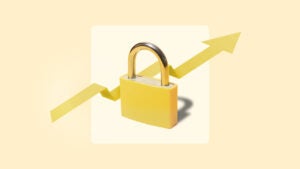Ask Bankrate: Is now a good time to invest in physical gold?

Ask Bankrate is a recurring feature where Bankrate’s experts answer your financial questions. Visit this page for more information on how to submit your question. Click on a question here to jump straight to it.
Questions:
- Should I invest in physical gold?
- Are we in an investing bubble?
- Retiring next year. Should I stop adding to 401(k)?
- What advice do you have for new real estate investors?
- Is rental property a good investment?
Q1: Should I invest in physical gold?
Is now a good time to invest in physical gold?
— Tim H.
Answered by James Royal, senior reporter for investing and wealth management: “While we never know how an investment will perform in the future, gold has done well in periods of economic turmoil. Many traders turn to gold when real interest rates are about to turn negative or predominate, driving up its price. Real interest rates are rates after the effect of inflation. In periods of stress, when the Federal Reserve lowers nominal rates, real rates may drop into negative territory. Savers earn little on their money, but inflation still continues. So gold becomes a popular go-to commodity as a store of value. The thinking is that the price of hard assets will appreciate as the value of cash is eroded by inflation. Ultimately, it can become a self-fulfilling prophecy, as rising expectations and the climbing price of gold draw in more investors.
You have several good options to invest in gold and at least one poor option. While you can buy physical gold yourself, a more attractive option is to own an ETF that holds gold, so that you don’t have the hassle of guarding it. You’ll still get all the benefits of physical gold at a modest annual fee. If you’re looking for a higher-return option (with higher risk), you can opt for a gold miner, but stick with an established player and avoid junior miners. You can even buy a diversified set of miners via ETF.
If you opt for physical gold, however, stay away from collectible coins or similar. The price of these items, at least if bought from the producer, can be twice the going rate for gold. While you might buy a beautiful collectible, you could easily lock in a 50 percent loss right from the start. And that’s nobody’s idea of a good investment.”
Q2: Are we in an investing bubble?
Several experts have stated that we have several “bubbles” going on right now. Do you see any, and what outcomes do you forecast for them?
— Frederick C.
Answered by James Royal, senior reporter for investing and wealth management: “Bubbles by their very definition are assets that have been bid up to unsustainable levels, so the end of a bubble is always rapidly deflating asset prices, if not outright bankruptcy for many of the players involved. The housing bubble of the early 2000s was a classic example, and it had the added danger of all that bad debt financing those assets.
While financial commentators have been saying that stocks are in a bubble for the past decade, they’ve continued to run higher, in large part because company earnings have continued to grow. Today stocks might be in a bubble, but most stocks are still well off their highs for the year, and it’s relatively few high-flying stocks (Amazon, Apple, Facebook and others) that have held up the market as a whole. Of course, some stocks are in bubble territory, but very high valuations are not prevalent across a wide range of stocks, as they were in the 1999-2000 dot-com bubble. Real estate doesn’t look especially inflated, particularly as low interest rates have made homes more affordable and demand is outstripping supply in many markets. That’s not to say that any of these assets can’t decline, but their prices are not so markedly out of whack that they won’t ever recover. In contrast, bitcoin or other digital currencies are very likely worthless in the long term, and those are the kind of assets that investing legend Warren Buffet won’t touch. It’s these latter kinds of assets that have a greater chance to be in bubble territory because they don’t generate cash flow to support their valuations.”
Q3: Retiring next year. Should I stop adding to 401(k)?
I’m planning to retire in 2021, and I’m watching my 401(k) drop — it’s very concerning. Should I stop contributing and put money in savings?
— S. Braddock
Answered by Greg McBride, CFA, Bankrate chief financial analyst: “You may wish to earmark the contributions themselves toward very conservative investments such as a stable value fund or short-term, high quality bond fund. By accumulating a pool of safe money, you can make withdrawals in the early years of retirement without being forced to sell stocks at an inopportune time.
Ideally, you’d like to have your first five to seven years’ worth of withdrawals in conservative, low-risk investments at the point you retire. But I would strongly advocate for continuing to contribute to your 401(k) and accumulating savings that way. Your contributions are providing some tax benefits that you won’t get if saving outside of a retirement plan. Your pretax contributions are reducing your taxable income now, will grow without the headwind of taxes, and you’ll pay taxes when withdrawn in retirement. For Roth contributions, the money you contribute offers no tax benefit now but grows without the headwind of taxes and can be withdrawn tax-free in retirement. Your 401(k) contributions are also likely securing an employer match, which is free money.”
Q4: What advice do you have for new real estate investors?
What is your advice for beginner real estate investors?
— Attila N.
Answered by James Royal, senior reporter for investing and wealth management: “There are many ways to invest in real estate, and owning physical real estate is just one.
If you’re investing in physical real estate, one of the most important factors is making sure that you have a contingency plan if your rent is not being paid. Because real estate is typically financed, you need money coming in to pay that mortgage. If you can’t get a tenant in place, what’s your plan B? Do you have the money to pay the mortgage and other expenses from your primary job? What happens if the tenant simply refuses to pay the rent money? It can take months to evict the tenant, and you’ll be forced to cover the mortgage.
It can also be valuable to think another step ahead, too (i.e., plan C). If your plan B is to pay your mortgage with your first income, what happens if you lose your job? Can you cover the payment in the meantime? If a mortgage payment is a huge portion of your budget, then you might opt for another way to invest in real estate, such as a REIT, which won’t require a mortgage payment each month and in fact pays you with a dividend.”
Q5: Is rental property a good investment?
What are your thoughts on investing in rental property as an investment?
— Steve H.
Answered by James Royal, senior reporter for investing and wealth management: “Investing in real estate can be a great option, but it’s important to remember that there are many ways to do so. Owning a physical property is just one of many ways to invest in real estate, and it’s arguably the hardest, because of the need to actively manage it.
You’ll be in charge of all decisions – maintaining the property, making repairs, paying the mortgage, reviewing potential tenants and so on. And it’s important to remember that you’re on the hook for the mortgage, so if you can’t find tenants, then you’ll be paying for the mortgage yourself.
Like any investment, your purchase price is key to what you’ll make over time. So it’s very important that you set up a situation where you can rent the property for more than it costs you, ideally a lot more. While these are risks, the appeal of a reliable stream of cash flow is real.
A lot of value in owning physical assets comes after many years, when the mortgage is paid down or the rent has risen substantially. You’ll need the financial wherewithal to withstand any ups or downs — a tenant who can’t or won’t pay, for example — to get through to those good times later. But remember, owning a rental property is not the only way to invest in real estate, and investors have many different ways that require much less effort, including real estate investment trusts, which pay a regular dividend that you can collect from the comfort of your couch.”
Why we ask for feedback Your feedback helps us improve our content and services. It takes less than a minute to complete.
Your responses are anonymous and will only be used for improving our website.



